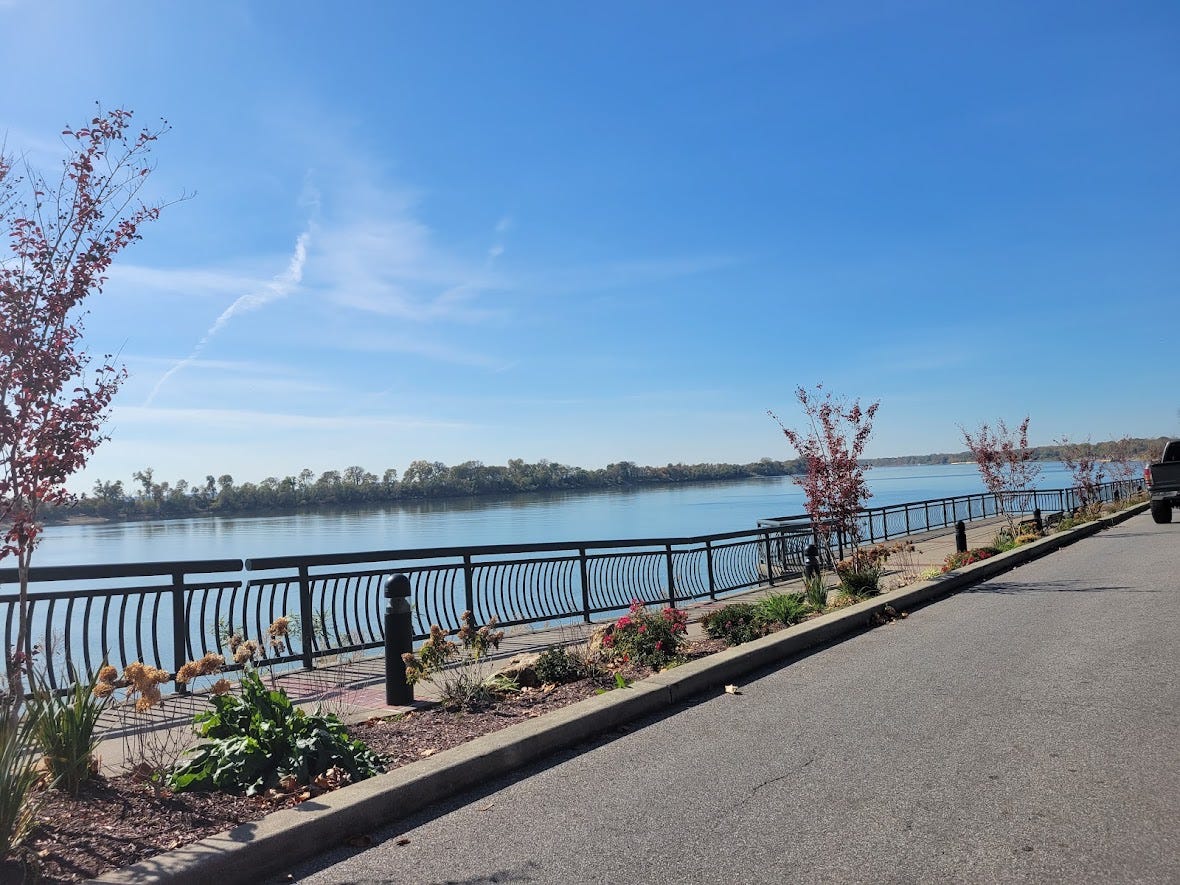The Sublime Wonder of an Ordinary Day
I see a million diamonds on the face of the river.
The sun was shining for the first time in a week, exploding beaming rays of lemon yellow, where for days there had been only overcast, grey clouds. I parked my car in the space I preferred—it was available right in front of Honeymoon Coffee. What luck!
I stepped out of the car and was struck by the grandeur of the Ohio River, a river often scorned for its murky, brown water. Yet today a coal barge worked its way upriver, leaving a tiny wake of waves that rippled in the rare January sunshine. The blue sky backdropped the scene which made me pause for a minute, and I looked around. The Rivertown Trail, seven miles of designated riverfront for walking and jogging, passed before me. Up the hill, hundred-year-old buildings with fanciful architectural features are found by tourists and locals visiting the shops within.
Most days I zip through our little downtown riverfront and don’t even give a nod to the great river, or the cozy town that has been here since 1803. Yet people from out of town visit every day to see what I take for granted.
Why do we become so blind to what is directly in front of us? Easy answer. We get caught up in everyday life, which is fraught with complications. My brother, who is thirty months my younger, and I talked about this subject the other day. He’s been to three funerals in the last two weeks, and loss and grief are on his mind.
Our friends are all in the same transition period. Our parents are mostly gone. My father remains at 93 and one friend has a mother left, six months younger than my dad. Many female friends have lost spouses; many friends have lost siblings. And I’ve lost friends. And we all share the same secret—the outlook isn’t good for any of us. We will not be here—Methusaleh-like—in a century.
The irony of living is that by the time you catch on to this reality, your span of control over your life may have narrowed. You can no longer do all that you want to do. For some it is the cruel sentence of Lou Gehrig’s disease or Parkinson’s, others get and may beat cancer, and some experienced chronic, day-to-day illnesses. And there are the caregivers among us, those selfless people who provide care for those who have diseases or chronic illnesses. And the personal grief mounts as tiny losses change every day—no driving at night, long travel now impossible, and the everyday issues that most people face if they are lucky enough to have old age.
But like any Las Vegas casino, the house always wins. And as we age, we are given near daily reminders of this among those we love, close and far away. For all that Dylan Thomas’ famous poem advises, “Rage, rage into the dying of the light,” your rage doesn’t change the outcome.
So how do we cope? We each face what Emily Dickinson called a “carriage” in our own way, in our own time, unknown to us.
I return to my place on the river, realizing that I feel comforted by the magnificence of an ordinary day. Meeting my good friend for coffee at a small locally-owned shop near the river, feel the January sunshine on my face, my first cup of coffee in the quiet morning before my husband gets up, the challenge of each morning’s new puzzle.
Within an ordinary day, I find sublime peace and comfort. Be present in your own tiny mmoments of joy. Do not think about yesterday or tomorrow.
Do not go gentle into that good night
Do not go gentle into that good night,
Old age should burn and rave at close of day;
Rage, rage against the dying of the light.
Though wise men at their end know dark is right,
Because their words had forked no lightning they
Do not go gentle into that good night.
Good men, the last wave by, crying how bright
Their frail deeds might have danced in a green bay,
Rage, rage against the dying of the light.
Wild men who caught and sang the sun in flight,
And learn, too late, they grieved it on its way,
Do not go gentle into that good night.
Grave men, near death, who see with blinding sight
Blind eyes could blaze like meteors and be gay,
Rage, rage against the dying of the light.
And you, my father, there on the sad height,
Curse, bless, me now with your fierce tears, I pray.
Do not go gentle into that good night.
Rage, rage against the dying of the light
Copyright Poets.com
Because I could not stop for Death – (479)
Because I could not stop for Death –
He kindly stopped for me –
The Carriage held but just Ourselves –
And Immortality.
We slowly drove – He knew no haste
And I had put away
My labor and my leisure too,
For His Civility –
We passed the School, where Children strove
At Recess – in the Ring –
We passed the Fields of Gazing Grain –
We passed the Setting Sun –
Or rather – He passed Us –
The Dews drew quivering and Chill –
For only Gossamer, my Gown –
My Tippet – only Tulle –
We paused before a House that seemed
A Swelling of the Ground –
The Roof was scarcely visible –
The Cornice – in the Ground –
Since then – 'tis Centuries – and yet
Feels shorter than the Day
I first surmised the Horses' Heads
Were toward Eternity –
Emily Dickinson
Copyright Poetry Foundation




Amy, as I went through the titles of your various posts, having time finally to read a couple, this title was the one that called out to me. Beautiful title and such an important message, how the ordinary can be subliime. Reminds me of a feeling I had, which lasted a few days, after seeing a total solar eclipse. I share your perception that every moment has within it the possibility for wonder and awe. https://janefriedman.com/totality-effect-thoughts-new-year/
Timely. I took a walk today, my first walk in the first week of the first year without my mom.
"In our own way, in our own time". Perfect for me right now. Thank you.